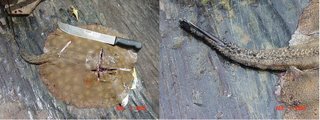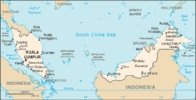Australia's 'Crocodile Hunter' Steve Irwin died during filming.
 The Associated Press - Published: September 4, 2006
The Associated Press - Published: September 4, 2006He stalked lions. He faced off with poisonous snakes. He wrestled with crocodiles. When the end came for television's beloved "Crocodile Hunter," it was in an encounter with a stingray and its venomous tail barb. Perhaps it wasn't surprising. Steve Irwin died doing what he loved best, getting too close to one of the dangerous animals he dedicated his life to protecting with an irrepressible, effervescent personality that propelled him to global fame.
The 44-year-old Irwin's heart was pierced by the serrated, poisonous spine of a stingray as he swam with the creature Monday while shooting a new TV show on the Great Barrier Reef, his manager and producer John Stainton said.
Marine experts called the death a freak accident. They said rays reflexively deploy a sharp spine in their tails when frightened, but the venom coating the barb usually just causes a very painful sting for humans.
News of Irwin's death reverberated around the world, where he won popularity with millions as the man who regularly leaped on the back of huge crocodiles and grabbed deadly snakes by the tail. "Crikey!" was his catch phrase, repeated whenever there was a close call — or just about any other event — during his TV programs, delivered with a broad Australian twang, mile-a-minute delivery and big arm gestures.
"I am shocked and distressed at Steve Irwin's sudden, untimely and freakish death," Australian Prime Minister John Howard said. "It's a huge loss to Australia." Conservationists said all the world would feel the loss of Irwin, who turned a childhood love of snakes and lizards and knowledge learned at his parents' side into a message of wildlife preservation that reached a television audience that reportedly exceeded 200 million.
In high-energy programs from Africa, the Americas and Asia, but especially his beloved Australia, Irwin — dressed always in khaki shorts, shirt and heavy boots — crept up on lions, chased and was chased by komodo dragons, and went eye-to-eye with poisonous snakes.
Often, his trademark big finish was to hunt down one of the huge saltwater crocodiles that inhabit the rivers and beaches of the Outback in Australia's tropical north, leap onto its back, grabbing its jaws with his bare hands, then tying the animal's mouth with rope.He was a committed conservationist, running a wildlife park for crocodiles and other Australian fauna, including kangaroos, koalas and possums, and using some of his TV wealth to buy tracts of land for use as natural habitat.
Irwin was shooting a series called "Ocean's Deadliest" in the water at Batt Reef, off the Australian resort town of Port Douglas about 100 kilometers (60 miles) north of Cairns, when he was stung. "The stingray's barb went up and into his chest and put a hole into his heart," said Stainton, who was on board Irwin's boat, Croc One, at the time. He died within an hour.
"He died doing what he loved best and left this world in a happy and peaceful state of mind," Stainton said, his voice wavering. "He would have said, 'Crocs Rule!'" Irwin's image was dented in 2004 when he held his month-old son, Bob, in one arm while feeding large crocodiles inside a zoo pen, touching off a public outcry. He argued there was no danger to his son. He also has a daughter, Bindi Sue.
Later that year, he was accused of getting too close to penguins and humpback whales in Antarctica while making a documentary. An official investigation recommended no action be taken against him.Irwin was born Feb. 22, 1962, in the southern city of Melbourne to a plumber father and a nurse mother, who decided a few years later to chase a shared dream of becoming involved in animal preservation.They moved to the Sunshine Coast in Queensland and opened a reptile and wildlife preserve at Beerwah in 1970. Irwin was in his element.
He was given a 3.5-meter (12-foot) scrub python for his sixth birthday and regularly went on capturing excursions with his father in the bushland around the park. He became obsessed with crocodiles, and in his 20s worked for the Queensland government as a trapper. Irwin's father, Bob, said his son had an innate affinity with animals from an early age, a sense Irwin later described as "a gift." Irwin said he learned about wildlife working with his parents rather than in school.
In 1991, Irwin took over the park, Australia Zoo, when his parents retired and began building a reputation as a showman during daily crocodile feeding shows.He met and married Terri Raines, of Eugene, Oregon, who came to the park as a tourist, that year. They invited a television crew to join them on their camping honeymoon on Australia's far northern tip.The resulting show became the first "Crocodile Hunter," was picked up by the Discovery Channel, and became an international hit.
Irwin was more famous in the United States than at home, where he typified a knockabout, rascally character Australians call a "larrikin." He starred in his own movie, "The Crocodile Hunter: Collision Course" in 2002 and appeared in the Eddie Murphy movie "Dr. Dolittle 2."
Irwin pulled barb out before death
Fatally injured by a stingray, Steve Irwin pulled its barb out of his chest before losing consciousness, dramatic footage of his last moments reveals. Friend John Stainton said the footage of the stingray attack which took the life of the Crocodile Hunter on the Great Barrier Reef was "shocking".
Mr Irwin, 44, died after the stingray barb punctured his chest while snorkelling off Port Douglas, in far north Queensland. A cameraman captured the incident during filming for Irwin's new project with daughter Bindi, eight, that was to debut in the United States next year. "I did see the footage and it's shocking," Mr Stainton told reporters in Cairns.
Mr Stainton, who was aboard Mr Irwin's vessel Croc One when the tragedy occurred, said it was likely the television star and naturalist died almost immediately as a result of the stingray's blow.
"(He was) probably a metre coming over the top of it," he said." He was underwater. I think, and the coroner's report will say what happened, but I think he died fairly instantly." Mr Stainton said he was still in disbelief that a stingray could claim his close friend's life." He was always on the precipice," he said.
"He always pushed himself to the very limits but I thought he was invulnerable and I think he did too." I think we all had that belief that we'd pull through whatever situation we were in and he has been in some very close shaves with snakes and crocodiles. "I would never imagine it to come from something like a stingray."
"It's a very hard thing to watch because you're actually witnessing somebody die ... and it's terrible."
Mr Stainton, also a producer and director of Irwin's popular television shows, said the footage showed Mr Irwin pulling the barb out of his chest before losing consciousness.
"It shows that Steve came over the top of the ray and the tail came up, and spiked him here (in the chest), and he pulled it out and the next minute he's gone." That was it. The cameraman had to shut down."

IRWIN'S FAMILY RUSHES BACK TO AUSTRALIAN HOME
Crocodile Hunter STEVE IRWIN'S wife and two children rushed from a family holiday in Tasmania to their Queensland, Australia home last night (03AUG06) after learning Irwin had died in a freak stingray attack. Irwin, a passionate conservationist, was killed when a stingray barb pierced his heart as he filmed footage for a new documentary on shallow reefs in north Queensland.
The footage of his fatal goring has been handed over to Queensland police, who are investigating the incident. According to boat owner PETER WEST, "Something happened with this animal that made it rear and he was at the wrong position at the wrong time and if it hit him anywhere else, we would not be talking about a fatality."
Irwin's family was hiking near Cradle Mountain on the Australian island of Tasmania when he was killed just after 11 am on Monday (04SEPT06). Wife TERRI, daughter BINDI SUE, 8, and son BOB, 2, flew out of Devonport, Tasmania to the Sunshine Coast on a chartered flight shortly after 5 pm. Bindi clutched a blanket and stayed close to her mother, while her younger brother Bob skipped ahead as the family walked across the tarmac to their aircraft.
The news of Irwin's sudden death shocked the world and sparked a huge outpouring of grief, particularly in his homeland of Australia and in the US, where he had found fame and fortune as an adventurer and naturalist.


















0 Comments:
Post a Comment
<< Home